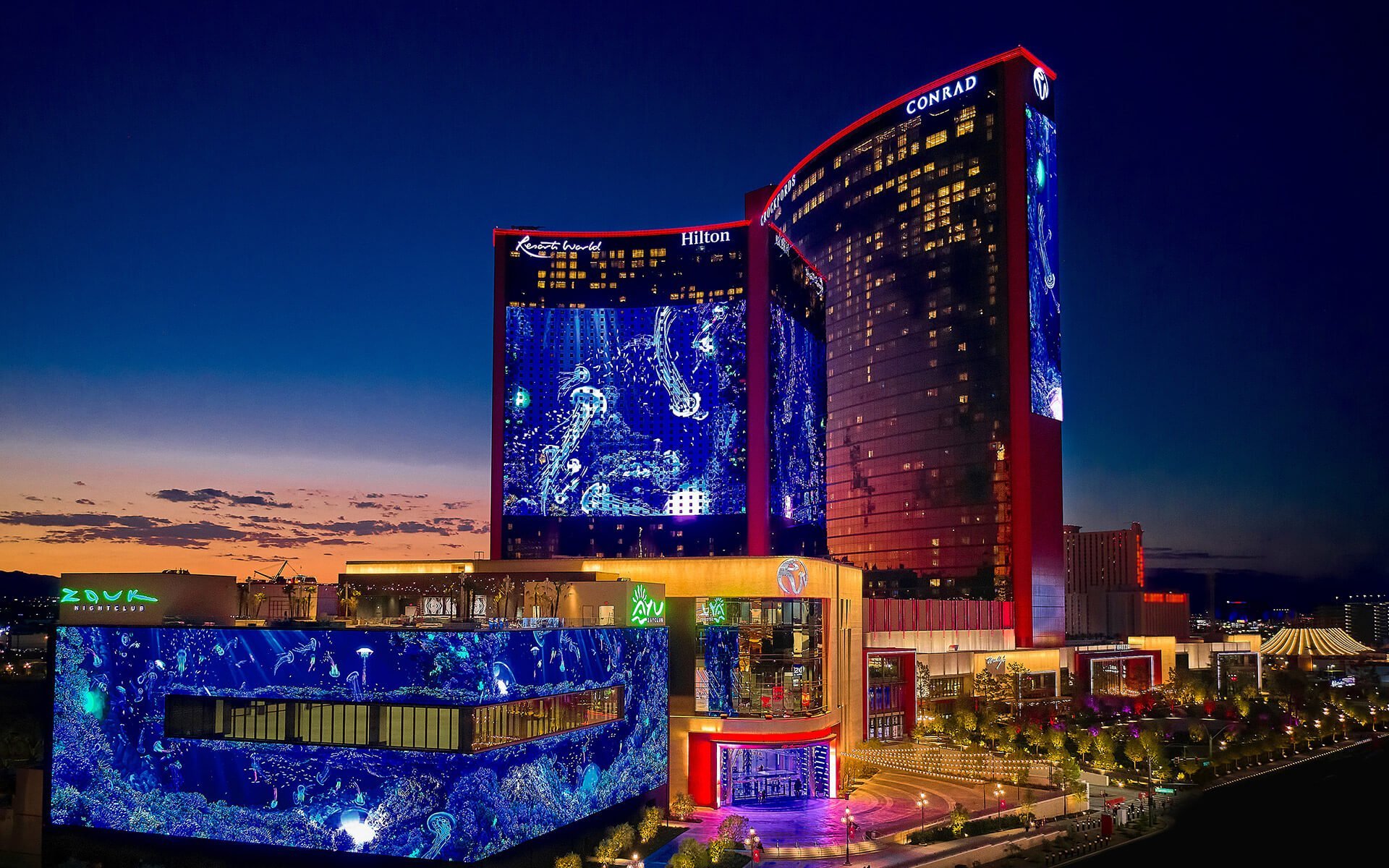Las Vegas' Resorts World Faces $10.5 Million Penalty For Money Laundering

Table of Contents
The Allegations: How Resorts World Fell Short of AML Regulations
Resorts World Las Vegas's $10.5 million penalty stems from alleged failures in adhering to crucial anti-money laundering regulations set forth by the Nevada Gaming Control Board (NGCB). The NGCB's investigation revealed several key areas of non-compliance. Specific allegations, though not fully public, reportedly include:
- Failure to file timely and accurate Suspicious Activity Reports (SARs): This suggests a potential disregard for reporting requirements concerning potentially illicit financial transactions. Late or incomplete SARs hinder law enforcement's ability to effectively track and investigate money laundering schemes.
- Inadequate employee training on AML compliance: Insufficient training leaves employees vulnerable to manipulation and unable to identify suspicious activity. This points to a systemic weakness in Resorts World's compliance program.
- Insufficient monitoring systems for high-risk transactions: The lack of robust monitoring systems to detect potentially suspicious patterns in financial activity allowed potentially illicit transactions to go unnoticed. This highlights the need for sophisticated technology and processes to analyze large volumes of data effectively.
- Weaknesses in customer due diligence procedures: This indicates a failure to properly verify the identity and source of funds of high-roller customers, a critical component of AML compliance.
The NGCB's investigation, which spanned several months, involved detailed reviews of financial records, interviews with employees, and analysis of internal controls. The specific regulations violated are still partially undisclosed, but the penalty clearly indicates serious breaches of Nevada's stringent gaming regulations related to financial crime.
The $10.5 Million Penalty: Breakdown and Implications
The $10.5 million penalty levied against Resorts World Las Vegas is a significant financial blow, representing one of the largest casino fines in recent Nevada history. While the exact breakdown of the penalty hasn't been fully publicized, it likely reflects the severity and extent of the AML violations.
This substantial fine will undoubtedly impact Resorts World's financial performance, potentially affecting profits and investor confidence. The penalty also sets a significant precedent for other casinos in Las Vegas and Nevada, highlighting the potential consequences of failing to meet stringent AML requirements. The message is clear: non-compliance comes with a steep price. The repercussions extend beyond financial penalties, potentially including reputational damage and stricter regulatory scrutiny in the future.
Industry Response and Future Regulatory Changes
The Resorts World penalty has sent shockwaves through the Las Vegas casino industry. While many establishments have declined to comment publicly, the case has spurred discussions about enhancing AML compliance programs and strengthening internal controls. Industry stakeholders are closely watching the situation, anticipating potential changes to regulatory frameworks in Nevada.
The NGCB's response indicates a heightened commitment to cracking down on financial crimes within the gaming sector. This case may lead to:
- Increased regulatory scrutiny: Casinos can expect more frequent and rigorous audits to ensure compliance with AML regulations.
- More stringent penalties for violations: Future penalties for AML non-compliance could be even higher, deterring future infractions.
- Changes to AML regulations: Nevada lawmakers may consider amendments to existing regulations, potentially introducing stricter requirements for casinos.
The industry is likely to see a renewed focus on AML best practices, with a greater emphasis on proactive risk assessment and robust compliance programs.
Lessons Learned and Best Practices for Casino AML Compliance
The Resorts World case serves as a critical lesson for all casinos, emphasizing the dire consequences of neglecting AML compliance. Key takeaways include:
- Invest in comprehensive employee training: Regular and thorough training programs are crucial to equip staff with the skills to identify and report suspicious activity.
- Implement robust transaction monitoring systems: Sophisticated systems capable of analyzing large datasets in real-time are essential for detecting potentially illicit financial activity.
- Strengthen customer due diligence procedures: Rigorous verification of customer identity and source of funds are paramount to prevent money laundering.
- Develop a proactive risk assessment strategy: Identifying and mitigating potential risks is critical for preventing violations.
- Establish clear reporting procedures: Clear guidelines and procedures for reporting suspicious activity must be established and communicated effectively to all employees.
By implementing these best practices, casinos can significantly reduce their risk of AML violations and avoid costly penalties like the one faced by Resorts World Las Vegas.
Conclusion
The $10.5 million money laundering penalty imposed on Resorts World Las Vegas highlights the critical importance of robust AML compliance within the gaming industry. The severity of the penalty underscores the potential consequences of non-compliance, impacting not only financial performance but also reputation and regulatory standing. Understanding Resorts World's penalty and improving your casino's AML strategy is crucial. Ensure your casino's AML compliance program meets the highest standards to avoid hefty penalties. Investing in comprehensive training, robust monitoring systems, and proactive risk assessment strategies is no longer optional—it's essential for the long-term success and sustainability of any casino operation. For further information on AML compliance best practices for casinos, refer to resources provided by the Financial Crimes Enforcement Network (FinCEN) and the Nevada Gaming Control Board.

Featured Posts
-
 Concerns Grow Over Easter Bonfires Amidst Dry Spell
May 18, 2025
Concerns Grow Over Easter Bonfires Amidst Dry Spell
May 18, 2025 -
 Spring Breakout Rosters 2025 Who To Watch
May 18, 2025
Spring Breakout Rosters 2025 Who To Watch
May 18, 2025 -
 Nyt Mini Crossword Answers For March 6 2025
May 18, 2025
Nyt Mini Crossword Answers For March 6 2025
May 18, 2025 -
 Best Bitcoin Casinos And Crypto Gambling Sites Of 2025
May 18, 2025
Best Bitcoin Casinos And Crypto Gambling Sites Of 2025
May 18, 2025 -
 60 000 Square Foot City Pickle Pickleball Center Opening In Brooklyn
May 18, 2025
60 000 Square Foot City Pickle Pickleball Center Opening In Brooklyn
May 18, 2025
Latest Posts
-
 Sodiq Yusuff Fight Could Decide Mairon Santos Weight Class Future
May 19, 2025
Sodiq Yusuff Fight Could Decide Mairon Santos Weight Class Future
May 19, 2025 -
 Watch Ufc 313 Complete Guide To The Event Fight Card And Tickets
May 19, 2025
Watch Ufc 313 Complete Guide To The Event Fight Card And Tickets
May 19, 2025 -
 Ufc Vegas 106 Staff Picks And Predictions For Burns Morales Main Event
May 19, 2025
Ufc Vegas 106 Staff Picks And Predictions For Burns Morales Main Event
May 19, 2025 -
 Post Fight Admission Mairon Santos And The Ufc 313 Result
May 19, 2025
Post Fight Admission Mairon Santos And The Ufc 313 Result
May 19, 2025 -
 Will Mairon Santos Stay At Lightweight After Facing Sodiq Yusuff
May 19, 2025
Will Mairon Santos Stay At Lightweight After Facing Sodiq Yusuff
May 19, 2025
